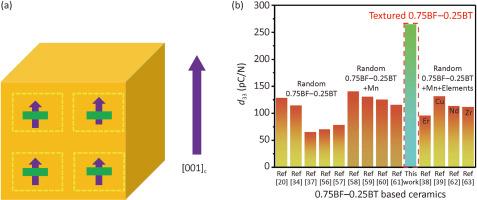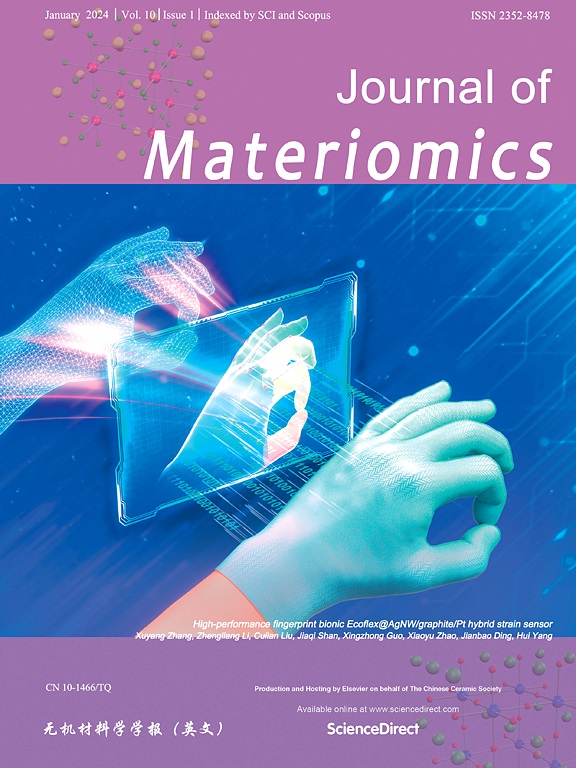Advancing piezoelectricity and excellent thermal stability: <001>-textured 0.75BF–0.25BT lead-free ceramics for high temperature applications
IF 8.4
1区 材料科学
Q1 CHEMISTRY, PHYSICAL
引用次数: 0
Abstract
There is an urgent need for piezoelectric materials possessing both high piezoelectric properties and good thermal stability to facilitate the advancement of high temperature piezoelectric devices. However, conventional strategy for enhancing piezoelectricity via chemical modifications often comes at the cost of thermal stability due to a drop in Curie temperatures. In this study, we achieved remarkable results in <001>-oriented 0.75BiFeO3–0.25BaTiO3 (0.75BF–0.25BT) lead-free textured ceramics. These textured ceramics exhibit a high Curie temperatures TC of 552 °C, large piezoelectric coefficients d33 of 265 pC/N, and exceptional piezoelectric thermal stability, with minimal variation of 8% across temperature from 25 °C to 300 °C. Compared to randomly oriented ceramics, the piezoelectric coefficient is about 2.5 times higher, marking it as one of the highest reported value for ceramics with Tc near 550 °C. The enhanced piezoelectric properties can be ascribed to improvements in both intrinsic lattice distortions and extrinsic non-180° domain motions, while the excellent piezoelectric thermal stability is attributed to the stable domain texture. These superior properties of the studied textured 0.75BF–0.25BT ceramics position them as competitive lead-free candidates for high-temperature piezoelectric applications.


先进的压电性和出色的热稳定性:用于高温应用的纹理 0.75BF-0.25BT 无铅陶瓷
为促进高温压电器件的发展,迫切需要同时具有高压电特性和良好热稳定性的压电材料。然而,通过化学修饰增强压电性的传统策略往往以居里温度下降导致热稳定性降低为代价。在这项研究中,我们在取向 0.75BiFeO3-0.25BaTiO3 (0.75BF-0.25BT)无铅纹理陶瓷中取得了令人瞩目的成果。这些纹理陶瓷的居里温度 Tc 高达 552 °C,压电系数 d33 高达 265 pC/N,并且具有优异的压电热稳定性,在 25 °C 至 300 °C 的温度范围内变化极小,仅为 8%。与随机取向陶瓷相比,其压电系数高出约 2.5 倍,是所报道的 Tc 接近 550 °C 的陶瓷中最高值之一。压电特性的增强可归因于内在晶格畸变和外在非 180o 畴运动的改善,而优异的压电热稳定性则归因于稳定的畴纹理。所研究的纹理 0.75BF-0.25BT 陶瓷的这些优异特性使其成为高温压电应用中具有竞争力的无铅候选材料。
本文章由计算机程序翻译,如有差异,请以英文原文为准。
求助全文
约1分钟内获得全文
求助全文
来源期刊

Journal of Materiomics
Materials Science-Metals and Alloys
CiteScore
14.30
自引率
6.40%
发文量
331
审稿时长
37 days
期刊介绍:
The Journal of Materiomics is a peer-reviewed open-access journal that aims to serve as a forum for the continuous dissemination of research within the field of materials science. It particularly emphasizes systematic studies on the relationships between composition, processing, structure, property, and performance of advanced materials. The journal is supported by the Chinese Ceramic Society and is indexed in SCIE and Scopus. It is commonly referred to as J Materiomics.
 求助内容:
求助内容: 应助结果提醒方式:
应助结果提醒方式:


